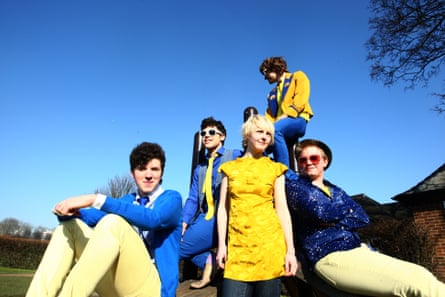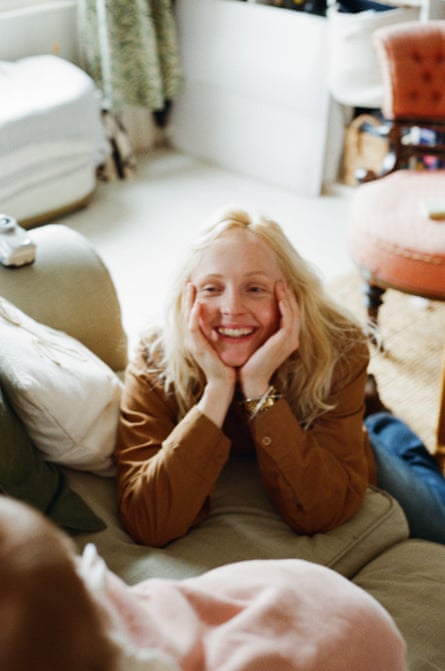Laura Marling is wondering whether to sacrifice her career for motherhood. The 34-year-old singer-songwriter, who first found fame with her enchanting yet earthy folk as a teenager, has decided to stop touring completely after becoming a parent. In fact, she might pack in the whole music thing entirely. “One of the great privileges of my life is turning out to be that I started my career early, and I can sort of wind it down,” says Marling with cool-headed contemplation: her conversational trademark.
We are in the living room of her London house, which is being redecorated – everything is piled into boxes; the one next to me is crowned with a baby music book and multicoloured blocks. Marling is on the floor, absent-mindedly pushing the legs of her trousers up over her knees and back down again. “There’s a part of me that feels like, will I just disappear? Maybe it would be nice to go and get old out of the spotlight – like Kate Bush.”
Marling is remarkably cheery at the prospect of professional oblivion. Since having her daughter in February last year, motherhood has become her new calling: “I was like, I only want to be doing this, everything else is secondary.”
Being sated by past success certainly helps. As the creator of seven melodically sublime albums that muse on the pleasures, torments and mythology of womanhood, Marling has established herself as one of our most beguiling musicians. With six of those records charting in the UK Top 10, plus a slew of Brit, Grammy and Mercury prize nominations to her name, she feels she has nothing left “to prove to myself”. She also wants to support her partner, a songwriter turned charcutier who embarked on his new career just before Marling got pregnant. “It’s his time now, so that’s the arrangement we’re into,” she says.

That is one side of the story, anyway. The other is that Marling will be releasing her eighth album, the characteristically exquisite Patterns in Repeat, this autumn. She wrote it during the first three months of her daughter’s life. “I was just bouncing a BabyBjörn and playing guitar all day. It was all written looking her in the eye,” she says with total serenity and (somehow) not a hint of smugness. Marling was “high as fuck after giving birth, for six months. Literally psychedelically high,” a mood compounded by the realisation that parenthood hadn’t eroded her songwriting skills. “I felt such huge relief that it hadn’t changed that channel at all; I felt like the cat that got the cream.” After she had finished the album, she recorded it in a studio that she set up in the living room.
Marling feels her own beatific experience of motherhood is underrepresented. She found pregnancy itself “very painfully heteronormative – and I never use words like that, can I just say. But I was like: ‘Wow, there is no getting away from tits and ass,’ whereas that was never my pronounced feature!” But her new life with her daughter was unmitigated joy, and she struggled to find “anyone [saying]: I’m so happy that this has changed my life in this way.” Patterns in Repeat does just that, sometimes extremely literally. The closing track features the couplet: “I want you to know that I gave it up willingly / Nothing real was lost in the bringing of you to me.” On opener Child of Mine – a lush hymn to the cosmic joys and terrors of the mother-child bond – she vows she is “not gonna miss” a single moment of her daughter’s life. She is not wrong about her talents remaining intact; Child of Mine is the most beautiful thing she has ever written.
It can also be difficult to listen to: Patterns in Repeat is packed with songs that are quite agonising in their poignancy. I found Looking Back, an elegant, devastating dirge delivered by an elderly person confined to their chair and their memories, almost unbearable. “My dad wrote that song,” says Marling, delighted. She first discovered it in the tape archives of the recording studio her father (AKA Sir Charles Marling, 5th baronet) once ran. “He was young when he wrote it and he was imagining being old. Now he’s old.” How did he react to its inclusion? “He was grumbling, but I think he was secretly quite chuffed.”
Marling herself is a fan of writing from inexperience; another new track, Caroline, is a tale of a long-lost love disruptively re-entering an older man’s life. Bizarrely – or perhaps fatefully – her last album was titled Song for Our Daughter, and the title track was directed explicitly towards an imagined child. At that point, in 2020, Marling wasn’t even sure she wanted children. That “radically changed very soon afterwards,” when her friend, Sound of Metal director Darius Marder, told her that it would “be the greatest thing that’s ever happened to you”. His conviction “shot a bolt of lightning down me”, she says.

That ambivalence about motherhood had stemmed partly from Marling’s zeal for independence. Having moved from Hampshire to London as a teenager – where she quickly fell in with the mid-00s nu-folk scene, providing backing vocals for Noah and the Whale and collaborating with then-boyfriend Marcus Mumford – she subsequently relocated to Los Angeles to channel “this insatiable sense of freedom; I just wanted to be driving my own car across America with no one else there.” Later, regressive hypnotherapy unearthed a supposed “core memory” of Marling as a baby left crying outside in a buggy, until a babysitter appeared and “dismissed my distress”. The hypnotherapist traced back her embrace of the open road to this moment; as a result, Marling is “very conscious of my daughter’s experience of being dismissed, because I remember that feeling”.
Patterns in Repeat’s lead single – the kaleidoscopically celestial, meditatively finger-picked Patterns – is preoccupied with such familial cycles. Becoming a mother made Marling realise how totally her own parents loved her as a newborn, which put all life’s “little complications and difficulties into context”. She hopes if her children have children of their own “they might hit this realisation as well. That is an endlessly repeating cycle.” She is already envisioning herself as a grandmother. “I want my daughter to have kids as soon as she can – a ridiculous thing to say, but you just want as much time with [your grandchildren] as possible. My boomer parents had me quite late – my mum was 44 – so my daughter will only get limited time with them.”
For all her newfound focus on motherhood, there is the small issue of family finances. Marling admits that “touring was the biggest way I made money, and I do need to keep making money.” To that end, she is wooing subscribers to her Substack newsletter, also titled Patterns in Repeat, a series of richly referential, characteristically thoughtful essays on her life and the art of songwriting: “I’ve been doing it for nearly 20 years, and I’ve got quite a nice little collection of things to say.”

More incongruously, she is also a recent convert to TikTok, where she posts videos of acoustic guitar noodling plus silent, slightly eerie closeups of her face. Having barely used social media before the pandemic, she joined Instagram to promote Song for Our Daughter amid lockdown restrictions, finding it less of a “big deal” than she had feared. Marling originally turned to TikTok when studying for a master’s in psychoanalysis – a degree she began in 2020 to combat her hang-ups about having skipped university – discovering a group of users dedicated to discussing the subject (“I ended up thanking them in my thesis”), and continues to look at social media through an academic lens. “I feel like we should start discussing it as a fourth and fifth dimension of personality: on Instagram, you demonstrate a different kind of personality, Twitter’s another thing.”
To complicate things further, Marling must also reckon with her existing persona as a musician – one powered by her beauty, introverted poise and gorgeous voice. One of Marling’s TikTok videos homes in on her blank face obscured by a clutch of purple flowers, overlaid with a fan’s comment: “Laura Marling you are too ethereal for TikTok.” She is determined to treat such presumptions about herself with clear-headed humour: “If you don’t confront the fact that there’s a difference between that perception and who you are, you might have a psychotic breakdown. I think it happens to some artists. You have to make a joke out of it, slightly. You can try to lean into it like Tom Waits, really inhabit a character, but that’s quite a long commitment.”

Marling’s otherworldly persona also stems from the delicate simplicity of her songs. She credits her father and his “bird-like guitar style” with her gravitation towards timeless melody; he was “very cynical about contemporary music” when Marling was growing up, extolling the extended melodies of Stevie Wonder while complaining that “flat” contemporary pop sounded “like a zoo burning down”. Yet it is proving increasingly difficult to produce unadorned guitar music that doesn’t already exist. “Frequently now, I’ve already written it,” she admits of her songwriting efforts. New song Your Girl was directly inspired by guitarist Larry Carlton – who once played for Steely Dan – but in the end didn’t sound too similar. She plays the original on her phone to demonstrate, and then looks slightly perturbed. “Maybe I should have thanked him on the album. I’ll contact him somehow.”
Generally, however, she has little time for the accusations of plagiarism that plague contemporary pop, citing Elvis Costello’s approval of Olivia Rodrigo’s Pump It Up sound-alike Brutal (he wrote: “It’s how rock’n’roll works. You take the broken pieces of another thrill and make a brand new toy”). Yet she has less sympathy for Ed Sheeran’s numerous recent copyright travails. “I can see why if it’s Ed Sheeran – who for all intents and purposes is a songwriting bot; he’s as good as an algorithm, basically, at producing what’s popular – people being like: hang on, I fed that algorithm, I should have a little bit of that.”
Marling has been reflecting on how her songwriting has changed as she has got older. “I think you start out as a conduit for God – not literally, I’m not a religious fanatic – but [in the sense that] your frontal lobe hasn’t shut. There are things floating in the air and some people have an antenna for them, and I think that’s particularly potent when you’re young. As you get older, you gain all these experiences that give this profound meaning to life, so a different kind of artistry comes through.” In her youth, she was “obsessed with the injustice of being born a woman, which is so funny because I didn’t have any understanding of what that meant in the real world”. Yet the through-line is that her work has always been “very straightforwardly observing and regurgitating the experience of living, and it’s nothing more profound or cool than that; it’s got no edge to it.” She was once channelling “Bob Dylan and Joni Mitchell, now it’s more Townes van Zandt and Leonard Cohen”.
Her influences may be exclusively legend-level, but Marling feels she is less ambitious than her industry peers. “Sometimes people have that drive and that in itself is the talent, to want it really badly. I want it – or I like it – but I don’t want it that badly, and I don’t like it that much.” Even so, I leave her company pretty sceptical about her readiness to relinquish her career. Recently, she tells me, she did a live edition of The Adam Buxton Podcast, where she performed a few songs from Patterns in Repeat. “It was like drinking water when you’re really thirsty, I just hadn’t done it for such a long time.” On stage, she realised, “I fucking love this so much, I forgot how much I love it. And I guess I hadn’t really thought about how much I love it because I was just doing it without really thinking about it for 10 years. Now it feels a bit more precarious because it’s more difficult for me.” She laughs, bemusedly. “Maybe I should put more effort into being there.”
Source: theguardian.com


